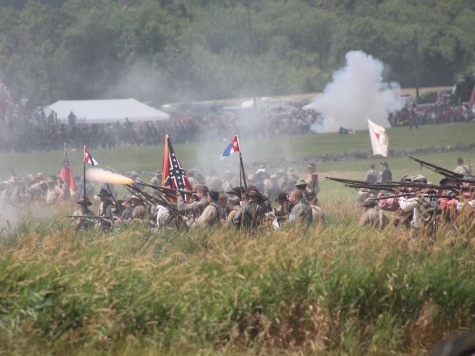Though the War of Rebellion would linger for several more years, the end result of the Battle of Gettysburg would seal the fate of both the Union and the Confederacy.
Over the course of the three day fight there had been a staggering 50,000 casualties from both sides. On Sunday, July 6 the Philadelphia Enquirer wrote the headline, “Victory! Waterloo Eclipsed!” The Army of the Potomac, which had been on the run for three years, had stood its ground under the command of newly appointed General George Meade and defeated General Robert E. Lee and the seemingly invincible Army of Northern Virginia.
Just several decades earlier, during the Mexican-American War, Meade and Lee had been in a small patrol boat together in an assault on Veracruz. They came under fire from Mexican cannons and both were nearly killed. But in 1863 Meade and Lee’s armies collided in one of the most influential battles in world history and these two men would steer their armies in a fight over the fate of the United States.
Josiah Gorgas, a Confederate general born in Pennsylvania who became president of the University of Alabama after the war, described the Confederate catastrophe at Gettysburg in his diary, “Yesterday we rode on the pinnacle of success. Today absolute ruin seems our portion. The Confederacy totters to its destruction.
The defeat at Gettysburg was not the only bad news for the Confederacy in the summer of 1863. A resolution to recognize the Confederate States of America was defeated in France, forever cutting all hope of a major Old World ally for the Southern States. Even more catastrophic was the surrender of Confederate forces in Vicksburg to General Ulysses S. Grant and the Army of the West.
Though Gettysburg rightly gets the most attention on the 150th anniversary, the Siege of Vicksburg, which also ended on the night of July 3, 1863 and was finalized on July 4, should not be overlooked.
General Grant, often unfairly maligned as a drunkard and a dullard, turned out to be a magnificent writer. In his memoir, perhaps the best of any former president, Grant wrote:
This news, with the victory at Gettysburg won the same day, lifted a great load of anxiety from the minds of the President, his cabinet and the loyal people all over the North. The fate of the Confederacy was sealed when Vicksburg fell. Much hard fighting was to be done afterwards and many precious lives were to be sacrificed; but the morale was with the supporters of the Union ever after.
Closing off the port of Vicksburg and shutting off Southern commerce was a blow that the Confederacy could not recover from, and the strength of their armies in the West gave Confederates no hope of retaking the vital hub. For his success in the Western theater, Grant was reassigned and took command of Meade’s victorious Army of the Potomac in the East.
When the war ended the South lay in ruins. Edmund Ruffin, a Southern radical who signed up for military service in his 60s to see John Brown hanged at Harper’s Ferry and claimed to have fired the first shot at Fort Sumter, wrote in his final diary entry:
I here declare my unmitigated hatred to Yankee rule–to all political, social, and business connections with the Yankees and to the Yankee race. Would that I could impress these sentiments, in their full force, on every living Southerner and bequeath them to every one yet born!
Ruffin then wrapped himself in an old Confederate battle flag and blew his own brains out with a shotgun.
Though sentiments like the ones expressed by Ruffin remained strong in the South for some time, it was leaders like Abraham Lincoln and Robert E. Lee that gave the region new life after the war. Lincoln, who reserved his wrath for the “ingenious sophists” that lead the Southern states to war and ruin, had “Dixie” played on the White House lawn when the surrender was formalized at Appomattox Court House.
Lee convinced Confederate President Jefferson Davis to avoid an insurrection and guerrilla war that would in the end cause far more harm to the South. Lee never hated the United States and did not view those who fought against him as the enemy. He always called Union forces “those people.”
Lee’s United States citizenship was restored by President Gerald Ford on August 5, 1975. It is the spirit of Lee that became the heart of the South, not the spirit of Ruffin. A recently released poll showed that Southerners, more than the people of any other region, are the proudest to Americans.
Free from the curse of slavery and now fully embracing the free-market capitalism that was frowned upon in the days just before it, the South is now a bastion of freedom and economic growth. The South also preserved traditional American values that were so apparent in their fighting spirit during the war, which is one of many reasons it is so important for Americans to look back and memorialize the valor and sacrifice that took place on the battlefield of Gettysburg 150 years ago.
Breitbart News’ coverage of the 150th anniversary of Gettysburg continues on Sunday, with a battlecast and a live re-enactment of Pickett’s charge, which will be directed by Robert Child. There will also be expert commentary that will discuss many of the pertinent issues associated with the battle and its legacy.
**Battlecast** Sign up today and watch the Gettysburg reenactment live!

COMMENTS
Please let us know if you're having issues with commenting.